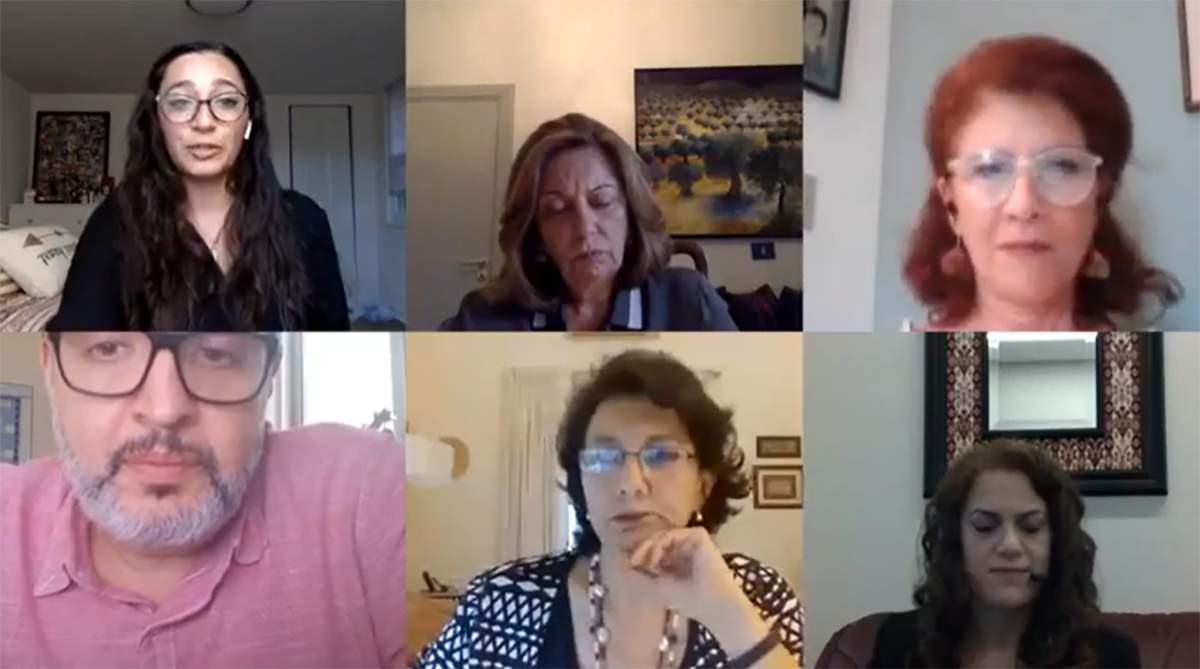UPA Panel Explores Way Forward for Humanitarian and Development Interventions in Lebanon
The devaluation of the Lebanese Pound, ongoing nation-wide protests, and the repercussions of the Coronavirus disease (COVID-19) pandemic have seriously impacted the livelihood of most people in Lebanon.
Home to the largest number of refugees per capita around the world, the ongoing crises in Lebanon continue to severely impact the livelihood of refugee communities in the country, pushing unemployment and poverty rates to alarming levels.
In an effort to raise awareness and funds for urgently needed humanitarian relief, United Palestinian Appeal held an expert panel discussion exploring the way forward for humanitarian and development interventions in Lebanon.
The panel, titled Lebanon: The Role of Nonprofits in Mitigating Collapse, was moderated by UPA Board member Salma El-Yassir, and featured Muna Khalidi, PhD, Health Policy and Planning; Dr. Ghassan Abu Sitta, Professor of Plastic and Reconstructive Surgery; and Dr. Dinah Ayna, Clinical Psychologist; and Melek El Nimer, Founder of Unite Lebanon Youth Project.
Maysa Amer, Donor Relations Associate at UPA started the panel with highlighting UPA’s decades-long role in Lebanon. “UPA has been working in Lebanon for over 30 years,” Amer said. “In 1982, a few years after UPA’s founding, Palestinian refugees suffered many devastating hardships in Lebanon. Most notably the Sabra and Shatila Massacre. As a response to this ongoing devastation endured by Palestinian refugees,” UPA established programs, supported hospitals, and forged partnerships with organizations on the ground “to swiftly address the humanitarian crisis,” Amer added.
Bearing this historical context in mind, El-Yassir led the discussion by noting that “Lebanon is currently undergoing the worst economic crisis in its history.” However, Palestinian refugees were suffering well before the crisis, she noted, emphasizing their urgent needs across the healthcare, mental health, and education sectors, as well as economic development.
Khalidi elaborated on the economic conditions, noting their historical roots. “Palestinian refugees have been living under terrible conditions for many years, with increasing poverty and a worsening living standard since the 1980s,” she said. These conditions mean that Palestinian refugees struggle to find employment opportunities, all while being banned from certain professions and unable to benefit from Lebanon’s government national security fund, she explained. More recently, the influx of Syrian refugees has exacerbated an overstretched infrastructure that today is not able to comprehensively support any refugee community, Khalidi added.
Currently, amidst the pandemic, Khalidi noted there is “a baseline disadvantage that Palestinian [refugees] are facing compared to Lebanese [nationals].” For example, among other economic indicators discussed by Khalidi, Palestinian refugees endure double the poverty rate of Lebanese nationals. “This shows us just how fragile the system is,” Khalidi said.
Dr. Abu Sitta highlighted the impact of this “severe and sudden impoverishment” on healthcare. “What we have been seeing as a result of severe and rapid impoverishment is that people have been going without or self-rationing their medications,” he said. Additionally, because Palestinian refugees cannot be treated at governmental hospitals, they can no longer afford “the rapid increase in the expenses of surgical procedures and in-patient care in the private sector,” Dr. Abu Sitta added. “That is one of the areas that NGOs need to start coming up with a comprehensive strategy to strengthen and increase the services available to Palestinian [refugees],” he continued.
One of the key areas of healthcare that requires urgent support is mental health. “There is a chronic collective trauma” that Palestinian refugees endure, said Dr. Ayna. This collective trauma is marked by a wide range of traumatic experiences dating back to 1948, which is only exacerbated by the current crises in Lebanon and the absence of mental health support. For example, “UNRWA does not cover mental health,” Dr. Ayna noted, leaving Palestinian refugees completely living with mental health challenges dependent on an overstretched support provided by NGO or local professionals at an untenable cost. “When you’ve got to choose between having food on the table or going to see a therapist, you are going to choose having food on the table,” Dr. Ayna continued. Hence, “it is extremely important for that we come together as a community, we come together as donors and really begin to support mental health in the camps because mental health is not a luxury,” she explained.
Unfortunately, due to technical difficulties, El Nimer was not able to contribute to the discussion. Relayed through the moderators, she believes that the single most important intervention to bring about change in the lives of Palestinian refugees in Lebanon is education.
The panelists proceeded to address questions from the audience online. You can donate to our efforts in Lebanon and watch the panel here.

